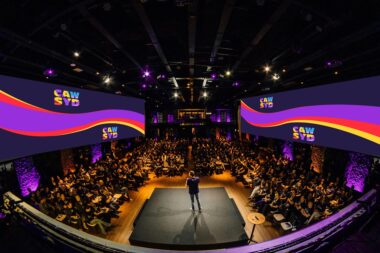
New research has revealed that children are exposed to alcohol product advertising on commercial television, highlighting the urgent need to close loopholes in the advertising code of practice.
The study, commissioned by The Foundation for Alcohol Research and Education (FARE) and Cancer Council Western Australia, found 70 per cent of Australian children aged 15 to 17 recalled seeing alcohol ads in the previous month.
Dr Ashlea Bartram, Senior Research Fellow at the National Centre for Education and Training on Addiction (NCETA) said one in three (32 per cent) children saw alcohol ads on television, despite laws banning alcohol marketing during children’s viewing hours.
“Commercial television was ranked highest among the 17 locations and media types where children recall seeing alcohol ads.
“They also saw ads in bottle shops, social media, and on the internet, with many being exposed to marketing across multiple sites.”
Ms Julia Stafford, Deputy Chair of Cancer Council’s Nutrition, Alcohol and Physical Activity Committee, said the research shows that alcohol advertising on commercial television has become so pervasive, children can’t avoid being exposed to it.
“We must see an end to this insidious creep of alcohol marketing into every area of our children’s daily lives.
“We know that when children are exposed to alcohol ads, they are more likely to start drinking earlier in life and at riskier levels.”
Ayla Chorley, FARE CEO said more needs to be done to protect children and young people from the harms of alcohol advertising.
“This really underscores the need for reform to the regulation of alcohol advertising, like the Commercial TV Code of Practice, which allows a “sports loophole,” permitting alcohol ads during televised sporting events.
“It defies logic that even though alcohol companies aren’t supposed to market their products to under 18s, they are allowed to advertise during televised sporting events when they know thousands of kids are watching.”
Industry body, Free TV Australia, has put forward a new draft code, which does not close the loophole and instead proposes to extend alcohol advertising on weekends, public holidays and school holidays – which could allow alcohol ads to run on TV during an additional 800 hours every year.
“This new data highlights how critical it is that the Australian Communications and Media Authority (ACMA) rejects Free TV Australia’s draft Code of Practice and demand an approach that meets community expectations – one that protects our children from harmful alcohol advertising at all times,” Ms Chorley said.
Previous research commissioned by FARE found most Australians (82 per cent) were concerned to some degree with alcohol being advertised during sports.
Almost all Australians (90 per cent) were concerned by Free TV Australia’s draft Code of Practice to potentially increase the number of alcohol ads on TV.
Professor Simone Pettigrew, Program Head, Food Policy at the George Institute for Global Health said, “Studies have consistently shown that children and young people are being exposed to alcohol ads on television that are designed to encourage and glorify alcohol use.
“We know Australians expect government agencies like ACMA to prioritise the health and wellbeing of kids ahead of the interests of alcohol companies, and right now they have the opportunity to do this by strengthening the Code.”
The latest data was taken from an online cross-sectional survey conducted in May 2024 and comprised a sample of 606 Australian children aged 15-17 years old. The sample matched the Australian population for gender and residential location.
ENDS
Media outlets are requested to promote help-seeking information when reporting on alcohol and other drugs, in line with the Mindframe National Guidelines.
Suggested wording relating this this media story: If you or someone you know needs support, please call Lifeline 13 11 14, 13YARN 13 92 76 or the National 24/7 Alcohol and Other Drugs Hotline 1800 250 015.
Available for interview:
-
Professor Simone Pettigrew, Program Head, Food Policy at the George Institute for Global Health
-
Julia Stafford, Deputy Chair, Cancer Council’s Nutrition, Alcohol & Physical Activity Committee
-
Ayla Chorley, Chief Executive Officer, FARE
Contact details:
Joanna Le
[email protected]
0402 265 145

